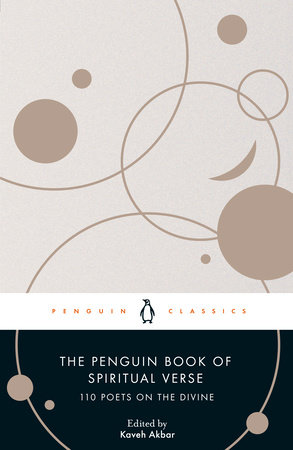Introduction
Enheduanna, from ‘Hymn to Inanna’
Unknown, ‘Death of Enkidu’, from The Epic of Gilgamesh
Unknown, from The Book of the Dead
Unknown, Song of Songs, chapters 1 and 2
King David, Psalm 23
Homer, from The Odyssey
Sappho, Fragments 22 and 118
Patacara, ‘When they plow their fields’
Lao Tzu, ‘Easy by Nature’, from Tao Te Ching
Chandaka, Two Cosmologies
Vyasa, from the Bhagavad Gita
Lucretius, from The Nature of Things
Virgil, from The Aeneid
Shenoute, ‘Homily’
Sengcan, ‘The Mind of Absolute Trust’
From the Quran
Kakinomoto Hitomaro, ‘In praise of Empress Jitō’
Li Po, ‘Drinking Alone Beneath the Moon’
Rabi’a al-Basri, ‘O my lord’
Ono No Komachi, ‘This inn’
Hanshan, ‘Hanshan’s Poem’
Al-Husayn ibn Ahmad ibn Khalawayh, ‘Names of the Lion’
Unknown, Anglo-Saxon charm
Izumi Shikibu, ‘Things I Want Decided’
Li Qingzhao, ‘Late Spring’
Hildegard of Bingen, ‘Song to the Creator’
Mahadeviyakka, ‘I do not call it his sign’
Attar of Nishapur, ‘Parable of the Dead Dervishes in the Desert’
St Francis of Assisi, ‘Canticle of the Sun’
Wumen Huikai, from The Gateless Gate
Rūmī, ‘Lift Now the Lid of the Jar of Heaven’
Mechthild of Magdeburg, ‘Of all that God has shown me’
Saadi Shirazi, ‘The Grass Cried Out’
Thomas Aquinas, ‘Lost, All in Wonder’
Moses de León, from The Sepher Zohar
Dante Alighieri, from Inferno, Canto III
from the Sundiata
Hafez, Ghazal 17
Yaqui people, ‘Deer Song’
Nezahualcoyotl, ‘The Painted Book’
Kabir, ‘Brother, I’ve seen some’
Mirabai, ‘O friend, understand’
Yoruba people, from A Recitation of Ifa
Teresa of Ávila, ‘Laughter Came from Every Brick’
Gaspara Stampa, ‘Deeply repentant of my sinful ways’
St John of the Cross, ‘O Love’s living flame’
Mayan people, from the Popol Vuh
Christopher Marlowe, from Faustus
William Shakespeare, Sonnet 146
John Donne, ‘Batter my heart, three-person’d God’
Nahuatl people, ‘The Midwife Addresses the Woman’
George Herbert, ‘Easter Wings’
Walatta Petros/Gälawdewos, from The Life and Struggles of Our Mother Walatta Petros
John Milton, from Paradise Lost, Book 4
Bashō, ‘Death Song’ and ‘In Kyoto’
Juana Inés de la Cruz, ‘Suspend, singer swan, the sweet strain’
Yosa Buson, ‘A solitude’
Olaudah Equiano, ‘Miscellaneous Verses’
Johann Wolfgang von Goethe, ‘Wanderer’s Nightsong II’
Phillis Wheatley, ‘On Virtue’
William Blake, ‘Auguries of Innocence’
Kobayashi Issa, ‘All the time I pray to Buddha’
John Clare, ‘I Am!’
John Keats, ‘Ode on a Grecian Urn’
Mirza Ghalib, ‘For the Raindrop’
Elizabeth Barrett Browning, ‘Grief’
Frederick Douglass, ‘A Parody’
Emily Dickinson, ‘I prayed, at first, a little Girl’
Uvavnuk, ‘The Great Sea’
Gerard Manley Hopkins, ‘God’s Grandeur’
Rabindranath Tagore, ‘The Temple of Gold’
Constantine Cavafy, ‘Body, Remember’
W. B. Yeats, ‘The Second Coming’
Rainer Maria Rilke, ‘The Second Duino Elegy’
Muhammad Iqbal, ‘These are the days of lightning’
Yosano Akiko, ‘To punish’
Sarojini Naidu, ‘In the Bazaars of Hyderabad’
Delmira Agustini, ‘Inextinguishables’
Gabriela Mistral, ‘The Return’
Anna Akhmatova, from ‘Requiem’
Osip Mandelstam, ‘O Lord, help me to live through this night’
Edith Södergran, ‘A Life’
Marina Tsvetaeva, from Poems to Czechia
María Sabina, from ‘The Midnight Velada’
Xu Zhimo, ‘Second Farewell to Cambridge’
Federico García Lorca, ‘Farewell’
Nâzim Hikmet, ‘Things I Didn’t Know I Loved’
Léopold Sédar Senghor, ‘Totem’
Faiz Ahmed Faiz, ‘Before You Came’
Czesław Miłosz, ‘Dedication’
Edmond Jabès, ‘At the Threshold of the Book’
Aimé Césaire, from Notebook of a Return to the Native Land
Octavio Paz, ‘Brotherhood: Homage to Claudius Ptolemy’
Oodgeroo Noonuccal, ‘God’s One Mistake’
Paul Celan, ‘There was Earth in Them’
Paul Laraque, ‘Rainbow’
Nazik Al-Malaika, ‘Love Song for Words’
Wisława Szymborska, ‘Astonishment’
Zbigniew Herbert, ‘The Envoy of Mr Cogito’
Yehuda Amichai, ‘A Man in His Life’
Ingeborg Bachmann, ‘Every Day’
Kim Nam-Jo, ‘Foreign Flags’
Kamau Brathwaite, ‘Bread’
Adonis, ‘The New Noah’
Christopher Okigbo, ‘Come Thunder’
Ingrid Jonker, ‘There Is Just One Forever’
Jean Valentine, ‘The River at Wolf’
Kofi Awoonor, ‘At the Gates’
Adélia Prado, ‘Dysrhythmia’
Lucille Clifton, ‘my dream about God’
Vénus Khoury-Ghata, from She Says
Mahmoud Darwish, ‘I Didn’t Apologize to the Well’
M. NourbeSe Philip, from Zong!
Inrasara, from Allegory of the Land
Sources
Acknowledgements
Index of First Lines
Index of Titles



